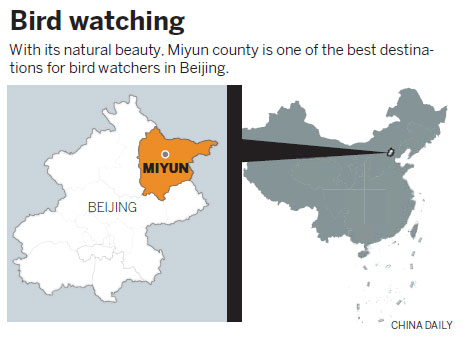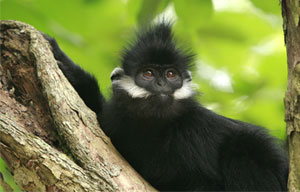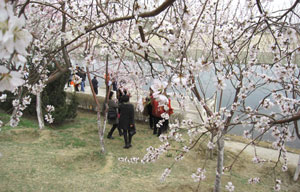Unfeathered friends flock together
As a recreational activity, bird watching really took off in Western countries during the mid-20th century. The activity was introduced to China two decades ago and, although more than 10,000 enthusiasts have participated, only around 1,000 describe themselves as serious enthusiasts.
By pollinating plants, dispersing seeds, scavenging on carcasses and recycling nutrients, birds help to keep the ecosystem balanced, according to Zhao Xinru, an ornithologist at Beijing Normal University.
"When you see birds nesting in the woods or swimming in a pond, you know that the ecosystem is functioning well - if they're around, they must have found food, but they're also preyed upon," Zhao said. "Bird watchers are the group most sensitive to the indications given by the birds."
"This basic data is very important. Five or more years of recording can indicate the trend of environmental change over the long term," Zhao explained. "However, professional researchers rarely have the time or energy to collect every fact, so the survey is usually conducted by well-trained amateur bird watchers."
To aid environmental protection, birders need to equip themselves with scientific knowledge more than a pair of binoculars, Zhao said.
"Sometimes a increase in the numbers of a certain bird doesn't mean the environment is 'getting better'. It could be quite the opposite; it could be that the environment is getting worse and so the birds are losing their habitats and are gathering in the few places that are left," she said. "Bird watchers can work alongside academics to read the numbers."
"You don't have to be a biologist to be a bird watcher," said Gary Deghi, a birding enthusiast and senior wildlife biologist at the environmental consultancy Huffman-Broadway Group in the United States. When Deghi and his wife Shari joined one of the BBWS trips to Miyun reservoir, they were thrilled to spot several birds they had never seen before.
Ticking off species, or observing a long-sought-after species certainly brings the watchers a huge amount of enjoyment, said Deghi, adding that birders can make a contribution to science by providing information to organizations such as eBird, an online project that enlists amateurs to gather data for scientific use.
The eBird database was launched in 2002 by the Cornell Lab of Ornithology at Cornell University and the National Audubon Society, one of the oldest environmental and avian conservancy organizations in the US. It provides real-time data about bird distribution and abundance.
In addition to the database, US scientists also use common species such as tree swallows to detect toxins. The birds eat insects that hatch in lakes or stream sediment; pollutants in those ecosystems then show up in the birds' eggs and chicks. Meanwhile, similar research is conducted into air quality and levels of mercury in the oceans.
 |
Deghi said China is approaching the point the US reached 40 years ago where economic development and environmental protection must be pursued in tandem.
Growth of the birders
In 1996, Friends of Nature founded the first birding organization on the Chinese mainland. The organization has been researching avian diversity in Beijing for at least 16 years.
Shenzhen Bird Watching Society, in Guangdong province, has published research into bird conservation annually since it was founded in 2004.
Chengdu Bird Watching Society, in Sichuan province, works with other environmental groups, including The World Wildlife Fund, and Conservation International, to promote bird watching and environmental protection.
Last year, China's bird watchers helped promote stricter law enforcement and prevent the habitat of wintering birds from being turned into hunting grounds by illegal poaching and poisoning.
During the National Bird-loving Week, started in 1992 and usually held in April, it has become traditional to include lectures and forums on environmental protection for bird lovers.
Zhu Jiangling, 37, said when she began bird watching last year, she found a whole new dimension to the natural world. "It was like, there's this other thing in the world, which is completely unlike anything else, but so beautiful and amazing," she said, referring to the experience of watching a willow warbler in a Beijing park.
"I heard their trills and chirups and saw them perched on the tip of a branch," she said. "Through my binoculars, I even saw their eyes and the details of their feathers. Such a piece of art."
For Zhu, birds are special creatures. They symbolize the ability to take off and go wherever they please without limits, breaking the boundaries gravity imposes on earthbound creatures. Birds are the most liberated species because of their ability to fly, she said.
"We watch the birds, but we don't disturb them," said Hou Xiaoru, deputy director of the BBWS. "Birding itself is an example of environmental protection."
Hou said those who appreciate the beauty of birds, or any wild animal, could never hurt them or the environment in which they live: "Birds spread their wings and bridge the gap between our world and the natural world. Environmental protection can sometimes appear abstract, but once you actually start having an emotional connection with a part of nature, like birds, you know what needs to be done and what shouldn't."
Contact the writer at pengyining@chinadaily.com.cn
























